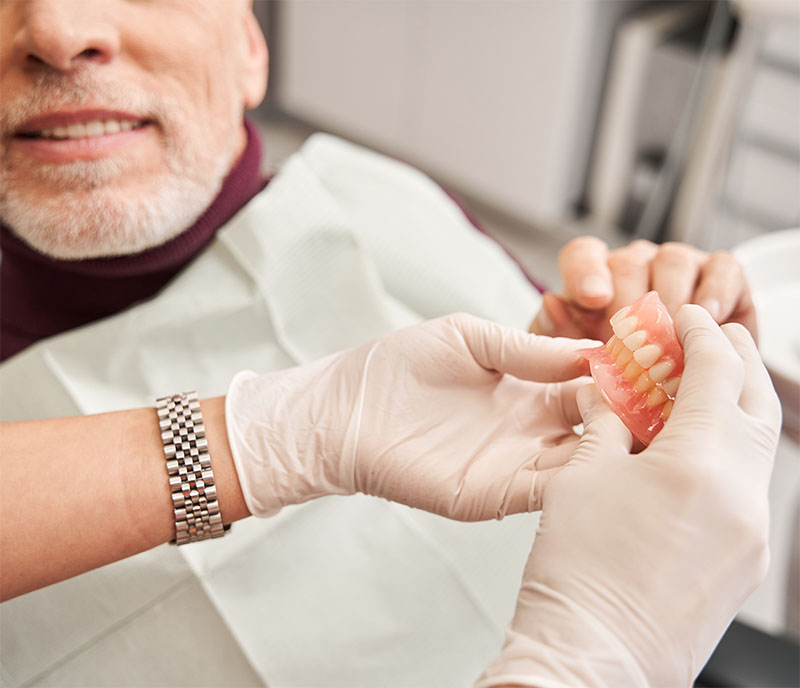Removable Dentures
Removable Dentures
If you have lost some of your teeth, you will inevitably experience problems with your ability to eat and your speech may also become affected. Often the teeth on either side of the missing teeth may start to migrate into this space, resulting in future challenges. When you are missing several teeth, your dentist may suggest that an option to replace these missing teeth is a removable denture.
These dentures can be easily removed from the mouth, cleaned and put back into the mouth.
Dentures can be made from acrylic (plastic), nylon or metal and may replace some missing teeth or all of your teeth. They fit closely on your gums and are reliant on the health of any remaining teeth (if present) and the quality of the underlying bone to properly support the denture and ensure a comfortable fit.

Dentures are prosthetic devices that are made to replacement missing teeth. If you have multiple missing teeth, you might be a good candidate for dentures.
Types of Dentures
Complete Dentures
This is when you have none of your own, natural teeth remaining. Complete dentures not only replace missing teeth, they also improve your appearance as they possess the ability to enhance the support of your lips and provide a more youthful appearance.
Partial dentures
These types of dentures are indicated when only a few teeth are missing and the remaining teeth are healthy enough to support and retain a denture. This may be a medium-term treatment for patients unable to afford dental implants, or it may be a transitional treatment prior to dental implants being placed.
Immediate Dentures
These are dentures that are fabricated prior to your unsalvageable teeth being removed. This treatment ensures that you never need to be without teeth, because on the day that the unsalvageable teeth are removed, the dentures are given to you to replace these teeth. Following the removal of your teeth, your gums will undergo healing and the shape thereof will change. These immediate dentures will then need to be relined or remade, if necessary, to improve the fit.
Implant-retained overdentures
This treatment provides improved retention and comfort to patients requiring dentures. Dental implants are placed, and a denture is fabricated to fit onto these implants in a “press-stud” fashion. Many patients know these to be “clip-on dentures”. This treatment is associated with more confidence as the denture is more stable and patients can smile/laugh without being concerned that the denture may fall out. Eating and speaking are also much more comfortable as the denture does not move around.

Dentures are custom made to suit each individuals needs and can be easily removed, cleaned and reinserted.
Complications experienced by denture-wearers
Sore spots
Due to the fact that dentures are not fixed in your mouth, they do move slightly under function (eating, speaking etc.). This may lead to friction between the gums and the denture resulting in ulcer formation. Often the specific area of the denture can be relieved (trimmed) to ensure improved comfort. In certain cases, it may not be possible to relieve the denture, and it may need to be remade or a fixed solution may need to be considered.
Poor fit
Once teeth have been removed, the bone that was surrounding each tooth starts to become less and less over time. Due to this constant changing of the shape of the gums, dentures may fit poorly. In certain cases, a conventional removable denture may not be possible due to the poor quality and amount of bone/gum in the jaw. The best treatment would then be to place dental implants to secure the denture.
Difficulty eating
If the dentures move while you eat, then this may lead to a reduced ability to chew and lack of confidence when eating in public. The only way to secure dentures is by means of dental implants.
Lack of confidence
Often denture-wearers experience shyness and may refrain from certain activities which may “expose” the fact that they are wearing dentures. Dental implants improve confidence and are associated with improvement in the patient’s quality of life.
Looking to get dentures? contact us today to schedule an appointment!
More about dental implants to secure a removable denture
The ideal required number of dental implants are placed into the remaining jaw bone. After sufficient healing has taken place, the denture is then fabricated to attach onto these implants. There are several mechanisms of attachment (individual studs, a bar joining the implants, etc.) and Dr Vorster or Dr Julyan will select the mechanism most applicable to your individual needs.
A denture retained by implants has the ability to restore your appearance, provide lip support as needed, and improve your overall ability to chew properly.
Patients report more confidence as the dentures are more secure and stable in their mouths. If a sufficient number of dental implants are placed in the upper jaw, then it may even be possible to avoid covering the middle portion of the palate with the denture. This would ensure improved comfort, speech and the ability to differentiate between temperatures of drinks/foodstuffs.
No patient should be self-conscious of their appearance due to tooth loss, or experience difficulty chewing or speaking due to ill-fitting removable dentures. If you require replacement of missing teeth or are currently dissatisfied with the removable dentures that you have, please contact us to arrange a consultation so that an individualized treatment plan can be provided for you.
Check out the other services available at Dr Christiaan Vorster:
Request Appointment
If you need a consultation or would like to make an appointment,
please use the form below or contact us on:
021 851 8123
